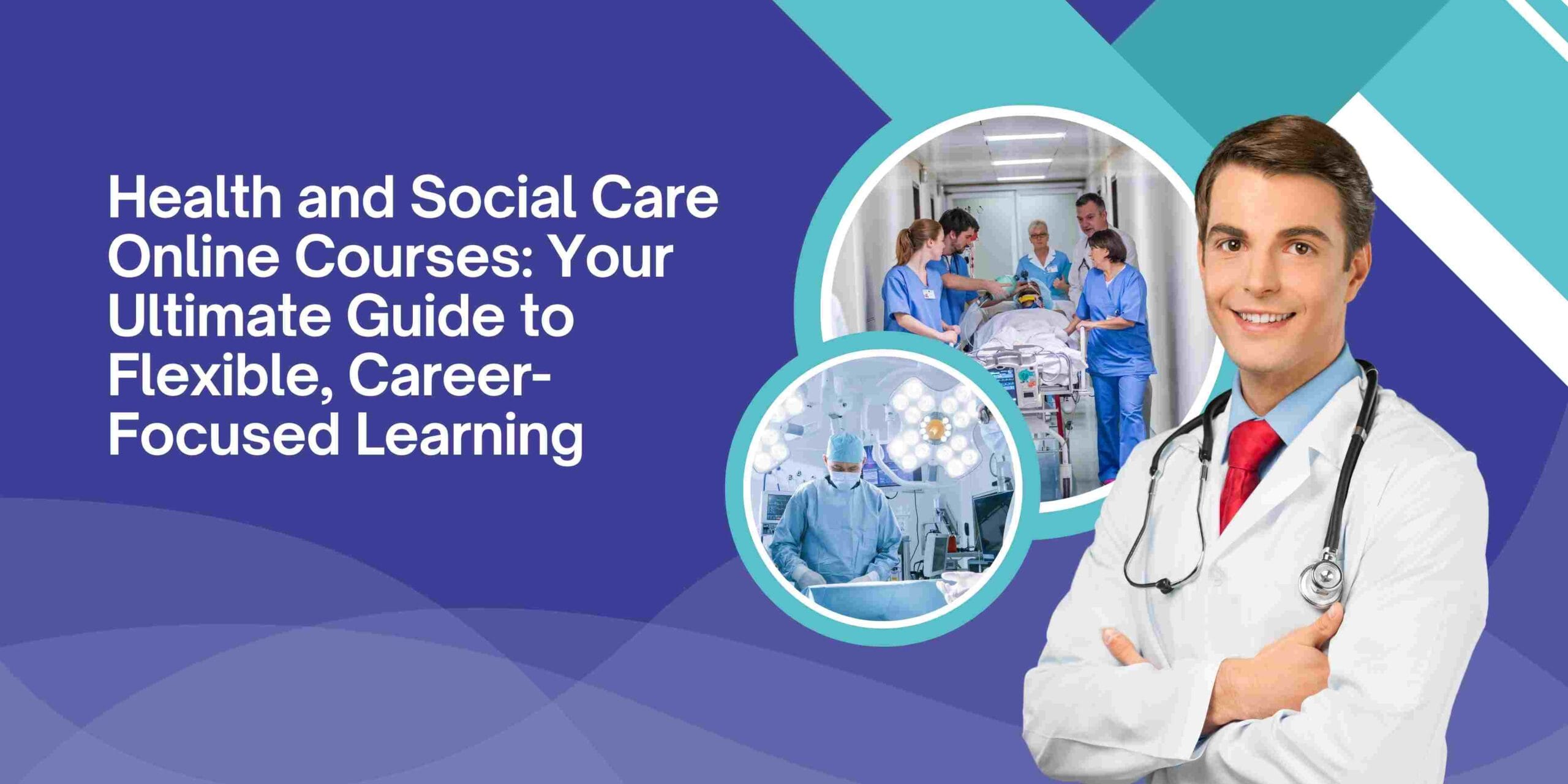

Health and Social Care Online Courses: Your Ultimate Guide to Flexible, Career-Focused Learning
Health and Social Care Online Courses: Your Ultimate Guide to Flexible, Career-Focused Learning
Table of Contents
Introduction to Health and Social Care Online Courses
What Is Health and Social Care?
Why Study Health and Social Care Online?
Benefits of Online Courses in Health and Social Care
Types of Health and Social Care Online Courses
Entry Requirements for Online Courses
Who Should Take Health and Social Care Online Courses?
Skills You’ll Learn from These Courses
Accredited Providers of Health and Social Care Courses
Health and Social Care Qualifications Explained
Level 2 Health and Social Care Online Courses
Level 3 Health and Social Care Online Courses
Level 4 and Above: Diplomas and Degrees
Health and Social Care Apprenticeships and Online Training
Free Health and Social Care Online Courses
Paid and Government-Funded Courses
Studying Health and Social Care as an Adult Learner
Flexible Learning and Self-Paced Study
Online Learning Platforms You Can Trust
Virtual Classrooms and E-Learning Tools
Assessment Methods in Online Health and Social Care Courses
How to Stay Motivated During Online Study
Career Paths in Health and Social Care
Job Roles You Can Pursue After Completion
Salary Expectations in Health and Social Care
Progression from Online Courses to University Degrees
Combining Online Learning with Practical Experience
Importance of Safeguarding and GDPR Training
Mental Health Awareness in Social Care Training
Supporting People with Learning Disabilities
Elderly Care and Online Dementia Training
Understanding Safeguarding of Children and Vulnerable Adults
First Aid and Emergency Response Skills Online
Equality, Diversity, and Inclusion in Online Training
Online CPD (Continuing Professional Development) for Professionals
Course Accreditation and Ofqual Recognition
How Employers View Online Health and Social Care Qualifications
International Recognition of Online Health and Social Care Courses
Reviews and Testimonials from Real Learners
Case Study: Becoming a Care Worker via Online Learning
Challenges in Online Learning and How to Overcome Them
Tips for Choosing the Right Online Course Provider
What to Look for in a Quality Health and Social Care Course
How to Enrol in a Health and Social Care Online Course
Funding and Bursaries Available for Learners
Combining Online Learning with Volunteering
DBS Checks and Online Training Compliance
Certification and Digital Badges Explained
Future of Online Health and Social Care Training
Final Thoughts and Recommendations
1. Introduction to Health and Social Care Online Courses
Health and social care online courses are flexible, accessible training programs designed to prepare individuals for careers in the healthcare and social work sectors. Whether you’re entering the field for the first time, upskilling for a promotion, or changing careers entirely, online learning offers the tools, knowledge, and qualifications needed for success — all from the comfort of your home.
2. What Is Health and Social Care?
Health and social care encompasses services that support individuals’ physical health, mental well-being, and social needs. It includes roles in hospitals, nursing homes, residential care, mental health services, community outreach programs, and more. These services aim to promote independence, improve quality of life, and provide support to vulnerable populations.
3. Why Study Health and Social Care Online?
Studying health and social care online allows students to access accredited, industry-relevant education at their convenience. It’s ideal for:
Busy professionals
Parents or carers
Learners in remote areas
Those switching careers
It enables flexible schedules, self-paced modules, and the ability to gain real qualifications without sacrificing current commitments.
4. Benefits of Online Courses in Health and Social Care
a. Flexibility
Study when and where it suits you — around work, family, or other responsibilities.
b. Affordability
Online courses often cost less than in-person training and eliminate commuting and accommodation expenses.
c. Accessibility
Learners worldwide can enroll, regardless of geographic location.
d. Career Advancement
Gain qualifications and skills that lead to jobs, promotions, or further study.
e. Certification
Earn recognized certificates, diplomas, or CPD credits essential for professional growth.
5. Types of Health and Social Care Online Courses
Short CPD courses
Level 2 Certificates
Level 3 Diplomas
Foundation Degrees
Bachelor’s Degrees
Postgraduate Courses
Specialist Training (e.g., dementia, autism, mental health)
6. Entry Requirements for Online Courses
Entry criteria vary:
Level 2: No formal qualifications needed.
Level 3: May require GCSEs or prior experience.
Degree programs: Require A-levels or equivalent, personal statement, and references.
Postgraduate: Undergraduate degree in related field.
7. Who Should Take Health and Social Care Online Courses?
Aspiring care workers
Support workers
Mental health professionals
Nurses or social workers in training
Individuals seeking a career change
Current professionals needing CPD
8. Skills You’ll Learn from These Courses
Effective communication
Empathy and ethical care
Record-keeping and confidentiality
Understanding legislation and safeguarding
Managing risk and promoting independence
First aid and emergency care
Care planning and assessment
9. Accredited Providers of Health and Social Care Courses
TQUK (Training Qualifications UK)
NCFE CACHE
City & Guilds
Open University
FutureLearn
Reed Courses
Coursera and edX (with university partnerships)
10. Health and Social Care Qualifications Explained
Each level corresponds to job roles and academic pathways:
Level 2: Entry-level roles
Level 3: Supervisory or further education access
Level 4/5: Management and foundation degrees
Level 6/7: Bachelor’s and Master’s degrees
11. Level 2 Health and Social Care Online Courses
Perfect for beginners. Topics include:
Introduction to care work
Safeguarding principles
Personal development
Duty of care
Often completed in 12–16 weeks.
12. Level 3 Health and Social Care Online Courses
Designed for those aiming for supervisory roles or university. Topics:
Equality and diversity
Health and safety
Person-centred care
Working with children or elderly
13. Level 4 and Above: Diplomas and Degrees
These courses prepare learners for:
Team leader positions
Managerial roles
University admissions
Includes deeper theory, leadership, and professional practice.
14. Health and Social Care Apprenticeships and Online Training
Apprenticeships offer a mix of online theory and real-world experience. Ideal for young people or career changers.
Intermediate (Level 2)
Advanced (Level 3)
Higher (Level 4+)
15. Free Health and Social Care Online Courses
Providers like Alison, OpenLearn, and government-funded UK courses offer free training in areas like:
Mental health
Elderly care
Communication skills
Great for gaining foundational knowledge.
16. Paid and Government-Funded Courses
UK residents may access fully funded Level 2/3 courses through the Adult Education Budget. Providers often offer payment plans or employer-funded options.
17. Studying Health and Social Care as an Adult Learner
Adult learners benefit from:
Self-paced schedules
Evening/weekend study options
No entry barriers for Level 2
Recognition of prior experience
18. Flexible Learning and Self-Paced Study
Most online health and social care courses are self-paced, allowing learners to:
Complete modules on their schedule
Retake assessments
Avoid set deadlines
19. Online Learning Platforms You Can Trust
Reputable platforms include:
Open University
Coursera (in partnership with top universities)
FutureLearn
Reed Learning
The Skills Network
SkillsUp Training
20. Virtual Classrooms and E-Learning Tools
Online learners benefit from:
Recorded video lectures
Downloadable resources
Interactive quizzes
Tutor feedback
Forums for discussion
21. Assessment Methods in Online Health and Social Care Courses
Multiple-choice exams
Case studies
Practical assignments
Reflective journals
Portfolio-based assessment
22. How to Stay Motivated During Online Study
Set goals
Break tasks into chunks
Join online student groups
Reward progress
Maintain a routine
23. Career Paths in Health and Social Care
Care assistant
Residential support worker
Social care officer
Support worker
Healthcare assistant
Community outreach worker
24. Job Roles You Can Pursue After Completion
Youth worker
Mental health support worker
Dementia care specialist
Home carer
Healthcare administrator
25. Salary Expectations in Health and Social Care
Varies by role:
Care Assistant: £18,000–£23,000/year
Support Worker: £20,000–£26,000/year
Social Worker: £28,000–£40,000/year
Registered Manager: £35,000–£50,000/year
26. Progression from Online Courses to University Degrees
Level 3 diplomas often provide UCAS points, enabling access to:
BSc in Health and Social Care
Nursing degrees
Occupational therapy programs
Social work degrees
27. Combining Online Learning with Practical Experience
Many students:
Volunteer locally
Work part-time in care roles
Complete placements (degree students)
28. Importance of Safeguarding and GDPR Training
Courses include:
Understanding abuse and neglect
Reporting procedures
Confidentiality and data protection
GDPR for care environments
29. Mental Health Awareness in Social Care Training
Specialist modules cover:
Depression and anxiety support
Suicide prevention
Crisis management
Mental health legislation
30. Supporting People with Learning Disabilities
Training includes:
Communication strategies
Behavioural support
Inclusive activities
Rights and advocacy
31. Elderly Care and Online Dementia Training
Topics include:
Dementia stages
Alzheimer’s care plans
End-of-life support
Family communication
32. Understanding Safeguarding of Children and Vulnerable Adults
Essential for all professionals. Covers:
Signs of abuse
Multi-agency working
Legal responsibilities
Prevent strategy
33. First Aid and Emergency Response Skills Online
Courses include:
CPR
Wound management
Seizure response
Emergency procedures
34. Equality, Diversity, and Inclusion in Online Training
Focuses on:
Anti-discrimination laws
Inclusive practice
Bias awareness
Cultural sensitivity
35. Online CPD (Continuing Professional Development) for Professionals
Short CPD courses help maintain professional registration and stay updated in topics like:
Autism awareness
Nutrition in care
Infection prevention
36. Course Accreditation and Ofqual Recognition
Ensure your course is:
Recognized by Ofqual
Delivered by a reputable training provider
Aligned with the Regulated Qualifications Framework (RQF)
37. How Employers View Online Health and Social Care Qualifications
Most employers accept and value online qualifications—especially when accredited. They look for:
Recognized awarding bodies
Evidence of practical application
Soft skills developed through online study
38. International Recognition of Online Health and Social Care Courses
Popular in the UK, these courses are also recognized in:
Ireland
Canada
Australia
Gulf countries (UAE, Qatar)
EU countries
39. Reviews and Testimonials from Real Learners
“I studied my Level 3 diploma while working full-time. Now I’m studying nursing at university.” — Fatima, UK
“The flexibility helped me balance family life and education.” — Daniel, Ireland
40. Case Study: Becoming a Care Worker via Online Learning
Sarah, a stay-at-home mother, completed her Level 2 and Level 3 courses online. She now works part-time in a residential care home and plans to study for a social work degree.
41. Challenges in Online Learning and How to Overcome Them
Isolation: Join forums or study groups
Procrastination: Use productivity tools
Tech issues: Choose user-friendly platforms
Lack of motivation: Set clear goals
42. Tips for Choosing the Right Online Course Provider
Check accreditation
Read reviews
Ask about tutor support
Compare pricing
Look for flexible study options
43. What to Look for in a Quality Health and Social Care Course
Tutor support
Video content
Real-world case studies
Practice assessments
End-of-course certificate
44. How to Enrol in a Health and Social Care Online Course
Choose your course and provider
Complete online application
Submit ID and documents
Pay (or apply for funding)
Begin learning immediately
45. Funding and Bursaries Available for Learners
Advanced Learner Loans (UK)
Local authority training schemes
Employer sponsorship
Scholarships for underrepresented groups
46. Combining Online Learning with Volunteering
Volunteering enhances learning and CVs. Roles include:
Visiting care homes
Supporting disabled individuals
Assisting community projects
47. DBS Checks and Online Training Compliance
If you work with vulnerable people, a DBS check is required. Many online providers help arrange this.
48. Certification and Digital Badges Explained
Upon completion:
Receive a digital or printed certificate
Earn badges for LinkedIn or CV use
Include in job applications
49. Future of Online Health and Social Care Training
Expect:
More AI and virtual reality training
Integrated job placement support
Micro-credentialing
Global access and multilingual content
50. Final Thoughts and Recommendations
Health and social care online courses offer a powerful, flexible way to build a meaningful career. Whether you’re beginning your journey or enhancing your existing skills, these programs empower you to make a difference in the lives of others — from anywhere in the world.
Read More: University Online Courses: A Complete Guide to Flexible Higher Education

